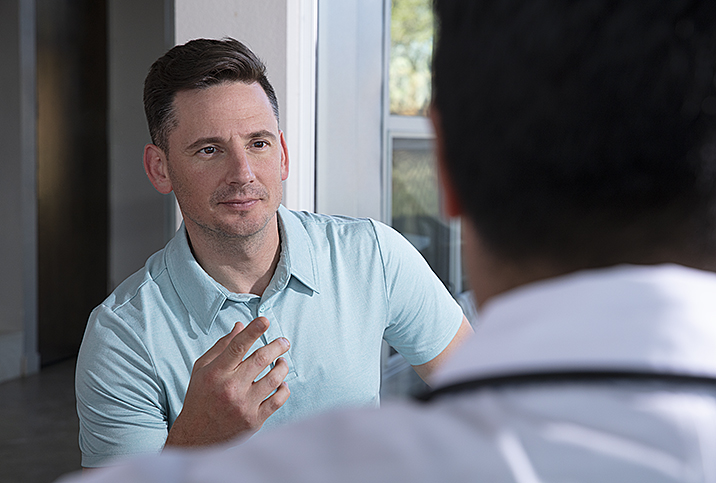Living and Dating With HPV

There are about 42.5 million active cases of human papillomavirus (HPV) in the United States, which is about 1 in 8 people, according to the Centers for Disease Control and Prevention (CDC). In fact, the CDC asserts HPV will infect virtually all sexually active people at some point in their lives.
The vast majority of people living with HPV are unaware they are hosts and may never receive a diagnosis. This is because a healthy, functioning immune system generally suppresses the virus, rendering no discernable symptoms. Plus, you'll probably be clear of it within a couple of years.
However, if genital warts appear, this indicates you may have a low-risk variant of HPV with no links to long-term cancer risks, whereas a high-risk HPV variant can place you at risk of developing cancer, most notably cervical cancer in women. A prolonged high-risk infection may be asymptomatic, so by the time you realize it, it may be too late, with cancerous lesions having already formed.
Living with HPV
HPV is a broad categorization that encompasses a family of viruses with more than 180 different variants and counting. While it's commonly labeled a sexually transmitted infection (STI), sexual activity and/or an exchange of bodily fluids aren't actually required to pass the virus.
An HPV infection can spread through basic skin-to-skin contact, though sex remains the primary way the virus propagates, and sexually active adults are the ones most at risk.
Although the CDC suggests that nearly everyone who has sex will probably be infected with the virus at some point in their life, it's still possible for people with HPV to live a normal life with normal relationships.
"Often, a sense of shame or judgment stems from a lack of knowledge or information," noted Melanie Bone, M.D., an OB-GYN in Florida and a member of the medical board of Daye, a gynecological health company. "HPV is absolutely nothing to be embarrassed or ashamed of. In fact, 8 out of 10 people will become infected with HPV within their lifetime."
"Patients should not feel left out or judged if they're diagnosed with an HPV infection," said
Jessica Shepherd, M.D., an OB-GYN in Dallas, the chief medical officer for Verywell Health and a member of the HealthyWomen Women's Health Advisory Council. "HPV is very common and nearly all individuals will have the virus at some point in their life. However, many of these infections resolve on their own, particularly in younger adults."
Most HPV infections (both high-risk and low-risk variants) get cleared by the immune system as long as the individual is not immunocompromised.
Be open while dating
If you have HPV and you're worried about what your date or partner may think, the best strategy is to educate them on the realities of this highly prevalent STI and have an honest conversation before sex.
"Anyone with HPV can have a normal sex life," said Babak Ashrafi, M.B.B.S., from the online retail outlet Superdrug Online Doctor, based in the United Kingdom. "It's always important to have a chat about any STI you have before having sex so that your partner can decide after being fully informed.
"Having an open, honest conversation with your partner before having sex with them, and giving them all the information they need, will help reduce stigma and allow them to make an informed choice," Ashrafi added. "Do it whenever it feels right. Even just before sex, it depends on how you've got to that situation and how you bring the subject up. I would never leave it to the point where you're both naked and already putting the other person at risk, as they won't have been able to make a proper decision. But when you feel the moment is right and comfortable, then go for it. Depending on the type of STI you have, you might be OK to have a different kind of sex than the one you were both planning on having."
While condoms may not fully protect you against HPV, they do reduce the risk of transmission.
"If you have HPV, you can still live a relatively normal life and still have intercourse," explained Monte Swarup, M.D., a board-certified OB-GYN in Arizona and the founder of HPD Rx. "Condoms can help reduce the risk of transmission but it doesn't eliminate it."
The best and most effective way to avoid HPV is vaccination.
"There is an HPV vaccine that exists and offers solid protection from the virus," Bone said. "If you haven't had it already, it is definitely worth considering."
Keep in mind, HPV vaccines are most effective when administered prior to exposure. Doctors recommend getting the vaccine early in your teens before you become sexually active.
Diagnosis and treatment
If you are HPV positive, there's no reason to be sorry, afraid or ashamed of your diagnosis. HPV is simply one of the most common risks for sexually active folks. There's no cure for it, but you can still manage your life easily enough.
"Getting diagnosed with HPV can be emotional," Swarup said. "It's important to remember that you can live a normal life and getting HPV is quite common. You can still have a happy life and a loving and committed relationship."
He recommended these tips for people diagnosed with HPV:
- Get regular checkups, including Pap smears
- Maintain healthy habits, such as diet and exercise, and avoid smoking
- Manage your stress levels
- Use protection, such as condoms
Our experts provided some more useful advice for how to live with HPV:
Honesty is always the best policy
"One has to declare the presence of HPV or previous warts to all new partners, which can cause a lot of relationship issues. Or even if you're in a long-term relationship [and] it can make your partner ask questions. There is no easy way. Honesty is best," advised Laurence Gerlis, M.A., M.B., chief executive officer and lead clinician at SameDayDoctor, based in the U.K.
"Remember that HPV is very common and most of the strains will not cause health problems," Swarup added. "It could be years before you develop symptoms, if at all. It's recommended to be open and have honest communication about your sexual history and health if you have a partner."
Let it out
"I always show no judgment and stay calm," said Robyn Faye, M.D., a member of the HealthyWomen Women's Health Advisory Council, based in Middletown, New Jersey. "I let my patient cry, if necessary; show anger, if necessary. And then I comfort them and share the facts and tell [them they] will not die from this, will live to fight another day and might never know who gave this to [them]. Don't try to pass the blame. Just heal and get better."
Be compliant and get educated
"After the diagnosis of HPV, it is important to be compliant with the follow-up screening and testing recommendations from your healthcare provider," said Judith A. Smith, Pharm.D., professor and director of the Women's Health Integrative Medicine Research Program at UTHealth Houston McGovern Medical School. "This is important because with early detection, abnormal cells or damaged cells can be removed to decrease the risk of progression to cancer."
She recommended becoming educated on HPV screening, cancer screening and how to make healthy lifestyle choices. She also mentioned looking into newer medications, such as AHCC supplementation, to support the immune system to clear persistent HPV infections.
Follow up with your physician
"If you have been diagnosed with an HPV infection, it's important to follow up with your physician to determine if additional testing or treatment is needed," Shepherd said. "Patients should partner with their physician to decide on an appropriate plan of treatment."
"If you've been diagnosed with cervical HPV, make sure you follow up on your HPV screening when you're supposed to," Ashrafi added. "Often, you will clear the infection yourself, but you need to keep a closer eye on your cervical health than you might otherwise. If you have developed warts, you can treat them with various gels and solutions or by freezing them with cryotherapy."
Keep up with the latest data
For more information on HPV, take a look at the following online locations:


















